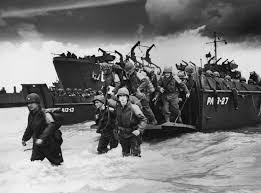The following scene and conversation occurs on Utah Beach, one of the D-Day invasion beaches.
"The beach was wind-swept, large and angry. The gray sky hung low over the rough, choppy water, and the surf pounded the beach with an animosity. An ominous pall seemed to hang over the place. Old enforcements and battle walls, pillboxes, and even strands of barbed wire were visible while cattle grazed over the dunes in fields where one of the decisive engagements of mankind's warfare had played out in blood.
"You can sense the terrible loss just standing here," Tim said, more to the wind than to Stroutsel, whose face was turned toward the beach, he seemed to be looking beyond time."
Stroutsel cut the misty wind of the beach with his gravel-like voice. "'Do not be eager in your heart to be angry, for anger resides in the bosom of fools.' Solomon, from Ecclesiastes, Calvin, it would do well for all of us to remember it."
They stood wrapped in silence and reflection as if in a place of prayer as sand and wind and salt spray assaulted them. Stroutsel faced squarely into the wind, and oblivious of Tim's presence, in calm still voice spoke,
"Baruch atah Adonai--Blessed art thou, O Lord, my rock who trains my hands for war and my fingers for battle. My loving kindness and my fortress, my stronghold and my deliverer, my shield and he in whom I take refuge."
Tim stood transfixed by the moment, and the sweeping emotions that girded them against the ghosts of this killing beach.
"We are a mere breath, our days are like passing shadows," Stroutsel's voice began to fade as he walked north, his eyes cast on the sand, looking out to the sea. Tim let him go."
It is a scene from my 1994 novel Sanibel Arcanum, in the chapter Island Darkness and a Norman Midnight. Now an old man, Stroutsel as a boy had been part of the French Resistance after escaping Germany when his parents and Jewish family were sent to a death camp. Tim Calvin was in France to speak with Stroutsel.



























